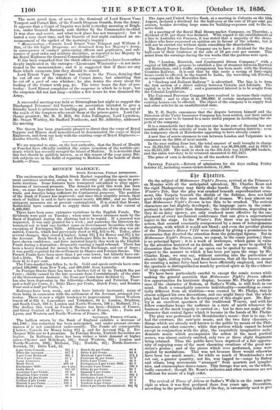6#t 61jtatrts.
On the subject of Midsummer Night's Dream, revived at the Prineess's on Monday with all the anticipated splendour, Mr. Charles Kean and the rigid Shaksperians may fairly shake hands. The objection to the Winter's Tale, that the play was crushed beneath superabundant orna- ment, like Tarpela beneath the shields of the Sabines, does not hold good with regard to this most fanciful of dramas. We may almost say that _Midsummer Night's Dream is too thin to be crushed. The serious characters are but slightly developed; the language (save in the comic portion) is rather lyric than dramatic ; the chief situations, depending as they do on fairy agency, are only rendered more effective by the em- ployment of every mechanical contrivance that can give a supernatural aspect to the stage. In the Winter's Tale there was an independent action, that seemed constantly overpowered by a mass of heterogeneous decoration, with which it would not blend ; and even the peculiar glories of the Princess's Henry VIII were attained by giving a prominence to accessories that diverted the attention from the principal figures. But in Midsummer Night's Dream, (save, we repeat, in the comic portion,) there is no principal figure; it is a work of arabesque, which gains in value by the attention bestowed on its details, and can no more be spoiled by decoration than the libretto of an opera can be spoiled by music. With respect to the manner in which it has been put upon the stage by Mr. Charles Kean, we may say, without entering into the particulars of electric light, sliding rocks, and floral lanterns, that all the known means for creating a mimic fairy-land have been efficiently employed, and that the spectacle is distinguished as much by poetical spirit as by the evidence of large expenditure. We have been particularly careful to except the comic scenes while making the general assertion that Midsummer Night's Dream affords few opportunities for histrionic display, because Mr. Phelps's perform- ance of the character of Bottom, at Sadler's Wells, is still fresh in our mind. Such a remarkably concrete individuality—something so essen- tially different from all tradition—was created by Mr. Phelps, that he almost eclipsed his own decorations, and one might fliney that the whole play had been written for the development of this single part Mr. Har- ley is an excellent specimen of the traditional Weaver, and with his fellow comedians keeps the audience in a state of mirth whenever the business of the mock tragedy is carried on ; but he does not make of the character that central figure which it became in the hands of Mr. Phelps.
The play was performed with Mendelssohn's music : that is to say, we had the overture, the entr'acte music, and the two fairy choruses,— things which are already well known to the public by means of the Phil- harmonic and other concerts ; while that portion which cannot be heard except in conjunction with the play, the exquisitely imaginative melo- dramatic music which accompanies the action in the most poetical scenes, was almost entirely omitted, only two or three slight fragments being retained. Thus the public have been deprived of a fair opportu- nity of enjoying some of the most charming creations of the great mu- sician's genius ; and of the pieces which were performed, some were spoiled by mutilations. This was not because there would otherwise have been too much music: for while so much of Mendelssohn's was cut out, a greater quantity, not his, was lugged in—songs by Bishop and others, long movements " arranged " from quartets and sympho- nies, and commonplace dance-tunes. This farrago was not, on the whole, badly executed ; though Mr. Kean's orchestra and other resources are not sufficient for music of a high order.


























 Previous page
Previous page